
Velvet spiders are a small group of spiders almost entirely limited to the Old World, with the exception of one species known from Brazil. In Europe, some are commonly called the ladybird spiders.
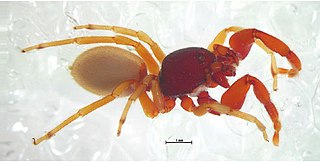
Palpimanidae, also known as palp-footed spiders, is a family of araneomorph spiders first described by Tamerlan Thorell in 1890. They are widely distributed throughout the tropical and subtropical regions of the world, the Mediterranean and one in Uzbekistan, but not Australia. They are not common and there is a high degree of endemism.
Herbert Walter Levi was professor emeritus of zoology and curator of arachnology at the Museum of Comparative Zoology, Harvard University. He was born in Germany, and was educated there and at Leighton Park School, Reading in England. He then received his higher education at the University of Connecticut and the University of Wisconsin. Levi authored about 150 scientific papers on spiders and on biological conservation. He is the author of the popular Golden Guide Spiders and their Kin, with Lorna Rose Levi and Herbert Zim.
Steriphopus lacertosus is a species of spider in the family Palpimanidae. The species is listed as critically endangered.
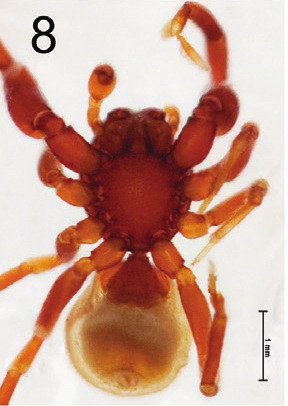
Steriphopus macleayi is a species of spider of the genus Steriphopus. It is endemic to Sri Lanka.
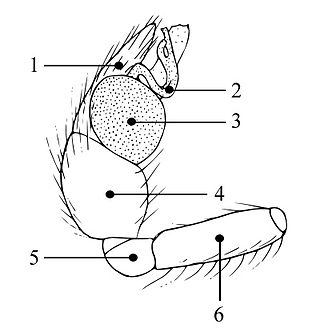
Anisaedus is a genus of palp-footed spiders that was first described by Eugène Louis Simon in 1893.

Boagrius is a genus of palp-footed spiders that was first described by Eugène Louis Simon in 1893. As of June 2019 it contains only two species, found only in Indonesia, Malaysia, and Tanzania: B. incisus and B. pumilus.
Chedima is a monotypic genus of Moroccan palp-footed spiders containing the single species, Chedima purpurea. It was first described by Eugène Louis Simon in 1873, and is only found in Morocco.
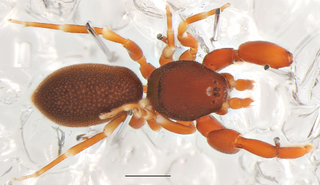
Diaphorocellus is a genus of African palp-footed spiders that was first described by Eugène Louis Simon in 1893.
Fernandezina is a genus of South American palp-footed spiders that was first described by M. Birabén in 1951.

Levymanus is a genus of palp-footed spiders that was first described by S. Zonstein & Y. M. Marusik in 2013. As of June 2019 it contains only two species, found in the United Arab Emirates, Saudi Arabia, Israel, and Ethiopia: L. gershomi and L. ras.
Notiothops is a genus of Chilean palp-footed spiders that was first described by Norman I. Platnick, C. J. Grismado & M. J. Ramírez in 1999.
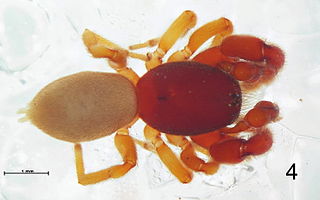
Scelidocteus is a genus of African palp-footed spiders that was first described by Eugène Louis Simon in 1907.
Chedimanops is a genus of spiders in the Palpimanidae family. It was first described in 2017 by Zonstein & Marusik. As of 2017, it contains 2 species, both from Congo.
Badia rugosa is species of Senegalese palp-footed spiders. It is the only species in the monotypic genus Badia. The species and genus were first described by Carl Friedrich Roewer in 1961. It is only found in Senegal.
Palpimanus hesperius is a spider species of the family Palpimanidae that is endemic on São Tomé Island. It was first named in 1907 by Eugène Simon.
Sceliscelis is a monotypic genus of east African palp-footed spiders containing the single species, Sceliscelis marshi. It was first described by A. D. Oketch, S. Zonstein and E. N. Kioko in 2020, and it has only been found in Kenya.
Tibetima is a small genus of east Asian palp-footed spiders. It was first described by Y. J. Lin and S. Q. Li in 2020, and it has only been found in China. As of March 2022 it contains only two species: T. char and T. gyirongensis.







